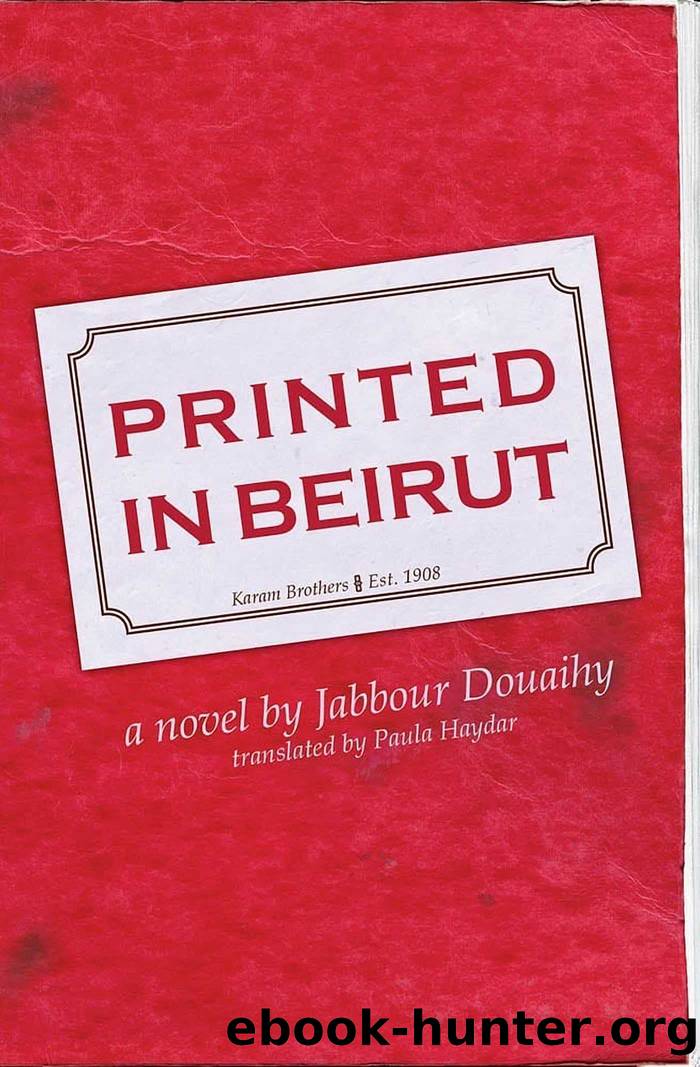Printed in Beirut by Jabbour Douaihy

Author:Jabbour Douaihy [Douaihy, Jabbour]
Language: eng
Format: epub
Publisher: Interlink Publishing Group Inc
Published: 2020-10-15T00:00:00+00:00
20
Farid Abu Shaar wrote standing up. Heâd heard once that standing keeps you alert, so up he stood. He didnât write wearily, but with all his senses ignited. He liked to imagine himself burning like a flame as he wrote, always with his favorite fountain penâthe silver Montblanc he inherited from his father, who in his time had received it as a gift from his relative Suleiman Abu Shaar to encourage him, when, in his youth, he had shown a fleeting curiosity for books and writers. But Faridâs father dreamed of a different world and never took the expensive pen out of its case except the day of his wedding so he, his bride, and their witnesses could sign the church registry, and another time to sign the IOUsâwith prepaid interestâhe took out from loan sharks when he had no other choice and needed money to open up his salon, Chez Hulim, in Furn al-Shubbak, and furnish it with two circular barberâs chairs and large mirrors. Halim died young and left the pen to his youngest son.
Farid was in fourth grade when he composed his first original lines. It was in Arabic class, prompted by one of the Arabic teacherâs favorite assignmentsââCompose a sentence using this word.â On that day, he started them with the word âapple.â The goal was for the children to build a âsubject,â âverb,â and âdirect objectâ around this common fruit, and come up with a simple sentence such as, âThe boy ate the apple.â Maybe the advanced ones among them would make a longer one, like, âAdam left Eden because he ate the apple.â And so, it was quite the surprise to him and to his classmates when Farid stood up and said in a poetic tone:
âThe earth is a red apple that moves along gingerly.â
The teacher raised his hand, signaling the class to be silent, as though not to taint the miraculous event that had just taken place there in the classroom. He then proceeded to ask the boy how old he was, if heâd had private tutoring, and so on. When Faridâs answers eventually revealed his family name, the teacher shook his head and let out a great sigh of relief for having found in the boyâs relation to the Abu Shaar family a genetic basis for his proficiency with the Arabic language and his poetic precociousness.
Farid did his writing up in his village where, while deep in thought searching for expression, the sounds of cannon fire reached him from beyond the chain of mountainsâa battle in the Syrian interior raged at night and the dead were left strewn in the open for days, as was broadcast in the news media the next day. He wrote standing up, with his papers and pen resting on the village church lectern that the priest agreed to let him borrow throughout the summer, except on Sundays. It was the same stand on which they placed the Holy Gospel, or the Synaxarionâthe book of the lives of the saints, left open even when there wasnât a reader standing before it.
Download
This site does not store any files on its server. We only index and link to content provided by other sites. Please contact the content providers to delete copyright contents if any and email us, we'll remove relevant links or contents immediately.
What's Done in Darkness by Kayla Perrin(25500)
Shot Through the Heart: DI Grace Fisher 2 by Isabelle Grey(18219)
Shot Through the Heart by Mercy Celeste(18160)
The Fifty Shades Trilogy & Grey by E L James(17774)
The 3rd Cycle of the Betrayed Series Collection: Extremely Controversial Historical Thrillers (Betrayed Series Boxed set) by McCray Carolyn(13189)
The Subtle Art of Not Giving a F*ck by Mark Manson(12912)
Scorched Earth by Nick Kyme(11832)
Stepbrother Stories 2 - 21 Taboo Story Collection (Brother Sister Stepbrother Stepsister Taboo Pseudo Incest Family Virgin Creampie Pregnant Forced Pregnancy Breeding) by Roxi Harding(11040)
Drei Generationen auf dem Jakobsweg by Stein Pia(10217)
Suna by Ziefle Pia(10186)
Scythe by Neal Shusterman(9260)
International Relations from the Global South; Worlds of Difference; First Edition by Arlene B. Tickner & Karen Smith(8608)
Successful Proposal Strategies for Small Businesses: Using Knowledge Management ot Win Govenment, Private Sector, and International Contracts 3rd Edition by Robert Frey(8419)
This is Going to Hurt by Adam Kay(7695)
Dirty Filthy Fix: A Fixed Trilogy Novella by Laurelin Paige(6453)
He Loves Me...KNOT by RC Boldt(5804)
How to Make Love to a Negro Without Getting Tired by Dany LaFerrière(5378)
Interdimensional Brothel by F4U(5304)
Thankful For Her by Alexa Riley(5161)
